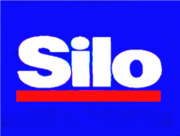
Silo (store)
Encyclopedia

Beginning
Founded by Sidney Cooper, Silo billed itself as an electronics discounter, operating big-box format stores, both as standalone units and attached to shopping centers and malls, that averaged from 10,000 to 12000 square feet (1,114.8 m²) in size. Some of its stores were much larger, including a 60000 square feet (5,574.2 m²) unit in Buffalo, New York.Silo purchased 26 stores from the Federated Group in 1989. They launched a huge ambiguous ad campaign on the west coast, "The Silos are coming", bringing much curiosity and at times fear to the upcoming date.
Silo was owned for a time by Cyclops Inc., a Pittsburgh, Pennsylvania-based specialty steelmaker. During that time, Silo was presided over by Barry Feinberg, a Philadelphia lawyer and son-in-law of the founder, Sidney Cooper. Under his leadership the chain expanded and showed considerable sales growth through the middle 1980's. Cyclops ultimately sold the retailer to Dixon Group Plc., a Great Britain-based firm, in the 1980s.
In 1986, the store ran a television ad, stating that they were selling stereo systems for "299 bananas." Customers in Seattle and in El Paso, Texas, took this to mean that the store would accept actual banana
Banana
Banana is the common name for herbaceous plants of the genus Musa and for the fruit they produce. Bananas come in a variety of sizes and colors when ripe, including yellow, purple, and red....
s for the goods. 32 stereos in the Seattle area and three in El Paso were sold. The stores lost $10,465 in revenue, whereas the bananas likely cost the shoppers between $35 and $50.
Buyout
In 1993, Silo was purchased for $45 million from Dixon Group by Fretter, Inc. Fretter was a Detroit, Michigan-based company that operated electronics stores under the Fretter's, YES! (short for Your Electronics Store), Dash Concepts, and Fred Schmid Appliance and TV Company banners. At the time of the purchase, Silo featured 183 stores that were, due to stiff competition from such retailers as Circuit City and Best BuyBest Buy
Best Buy Co., Inc. is an American specialty retailer of consumer electronics in the United States, accounting for 19% of the market. It also operates in Mexico, Canada & China. The company's subsidiaries include Geek Squad, CinemaNow, Magnolia Audio Video, Pacific Sales, and, in Canada operates...
, facing dwindling sales. The Fretter stores were facing similar competition, and Fretter management hoped that the combination would create a retail electronics powerhouse better suited to take on the up-and-coming companies.
Struggles
Silo, at the time of the purchase by Fretter, was damaged goods, and its inventory suffered the same fate. Fretter was faced with integrating a chain with both dwindling market share and outdated or damaged inventory. One way it dealt with this challenge was to convert several of the Silo stores into outlet-based units to sell off this excess inventory.Fretter also attempted to bill its stores as superstores, with marketing strategies similar to those of Circuit City and Best Buy. However, the small size of its Silo and Fretter's units (10,000 to 15000 square feet (1,393.5 m²), as opposed to 35000 square feet (3,251.6 m²) for a typical Circuit City of the time), made this an untenable strategy. According to one analyst, "Fretter was vanilla. You have to stand for something. They were so price-conscious that they never even thought about a personality. That's what our arguments with them were always about: You have to stand for something in the consumer's mind. You can't just live on price alone, or you'll go out of business."
Dwindling market share, lingering debt from the acquisition, and an outdated store format eventually doomed Fretter to failure. The company began to exit its markets, very quickly and quietly, as both customers and employees would find Silo stores suddenly closed during normal operating hours. Silo's seven Pittsburgh-area stores, for example, were closed in this manner, when employees received word that they were to pack all remaining inventory that day and close the store. Employees that remained silent during this manner of closing were told they would be paid a large severance. Scott White, a former store department manager, given the news reportedly went to the press with the information. This resulted in a mob of customers quickly flocking to the Pittsburgh area stores to demand their goods on lay-a-way, and money held by Silo. Silo reopened their doors for 3 days to accommodate these customers.
Demise
By the end of 1995, Fretter closed all remaining Silo stores and placed the parent company into bankruptcy. The demise of Fretter's remaining chains followed, as the remainder of the company's stores closed by May 1996.Further reading
- Francis, Lorna. "Is it better at Fretter: Recent acquisition boosts experts' outlook," Automotive News, February 28, 1994.
- Gaynor, Pamela. "Struggling retailer locks doors for 'inventory'," Pittsburgh Post-Gazette, October 14, 1995.
- "Merged Silo to keep Pittsburgh stores," Pittsburgh Post-Gazette, December 22, 1993.
- Roush, Matt. "How Fretter fell: 'Whole bunch of things' led to demise of appliance icon," Crain's Detroit Business, December 2, 1996.
- "Silo stores seek court protection," Pittsburgh Post-Gazette, December 6, 1995.
- Stouffer, Rick. "Silo to close local stores in September," The Buffalo News, August 24, 1995.
- http://findarticles.com/p/articles/mi_m3092/is_n22_v28/ai_8183737

